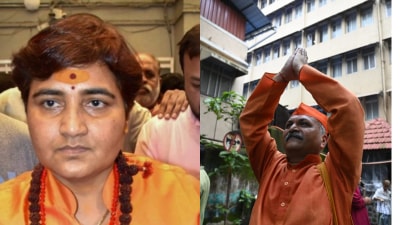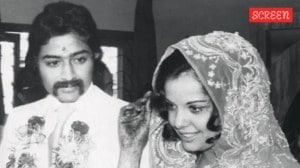Click here to follow Screen Digital on YouTube and stay updated with the latest from the world of cinema.
Malayalam star was saved from forced amputation by Nehru; locked horns with Mohanlal, Mammootty; lost National Award to Amitabh Bachchan due to lobbying
Even now, the legacy Thilakan left — as an actor and as a person who refused to bow to casteist lobbies, egoistic associations and superstars — remains an inspiration for generations.
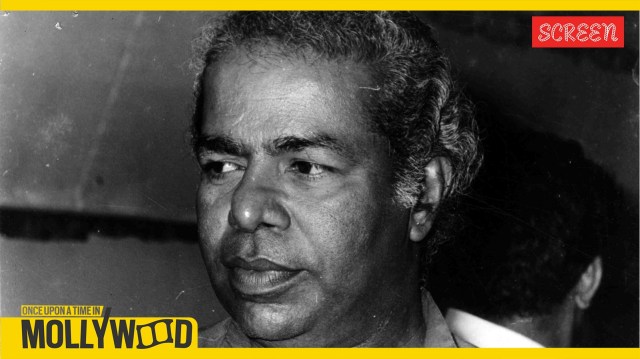 As great an actor as he was, Thilakan was also an unflinching critic of power. (Express archive photo)
As great an actor as he was, Thilakan was also an unflinching critic of power. (Express archive photo)Thilakan, the firebrand human being, or Thilakan, the unparalleled actor: whom do Malayalees remember more? Ooo, that’s a tough question, isn’t it? As great an actor as he was, Thilakan was also an unflinching critic of power, who ruffled the feathers of the powerful in Malayalam cinema. Even though he had to walk a lonely road, he never budged and always proceeded with his head held high. That, along with the countless benchmark performances he delivered, is why he is remembered and cherished even now, 13 years after his demise.
Born on July 15, 1935, in Ayiroor village near Thiruvalla, PK Surendranatha Thilakan joined Kollam SN College after finishing school. According to the institution’s website, he actively participated in the Arts Club’s activities and played key roles in several plays, including William Shakespeare’s Julius Caesar, in which he portrayed Mark Antony.
Thilakan’s encounter with Jawaharlal Nehru
Later, he joined the military. However, due to some ailments, he was soon confined to a bed in the hospital at his camp, and the authorities decided to amputate one of his legs, as was the practice of that era, veteran screenwriter John Paul recounted in a Safari TV show. One day, he said, the then-Prime Minister Jawaharlal Nehru visited the camp. Despite strict instructions from the top brass prohibiting anyone from interacting with Nehru, Thilakan spoke up as the PM was in the hospital. Explaining that the authorities had decided to amputate his legs without his or his family’s permission, Thilakan requested Nehru to save him from the procedure.
Upon returning to his office, the PM issued an order to have Thilakan transferred to a better hospital. Furthermore, he decreed that, henceforth, procedures like amputation should not be performed on soldiers without their or their close relatives’ consent. With the legs Nehru saved, Thilakan returned to Kerala, bidding goodbye to the military.
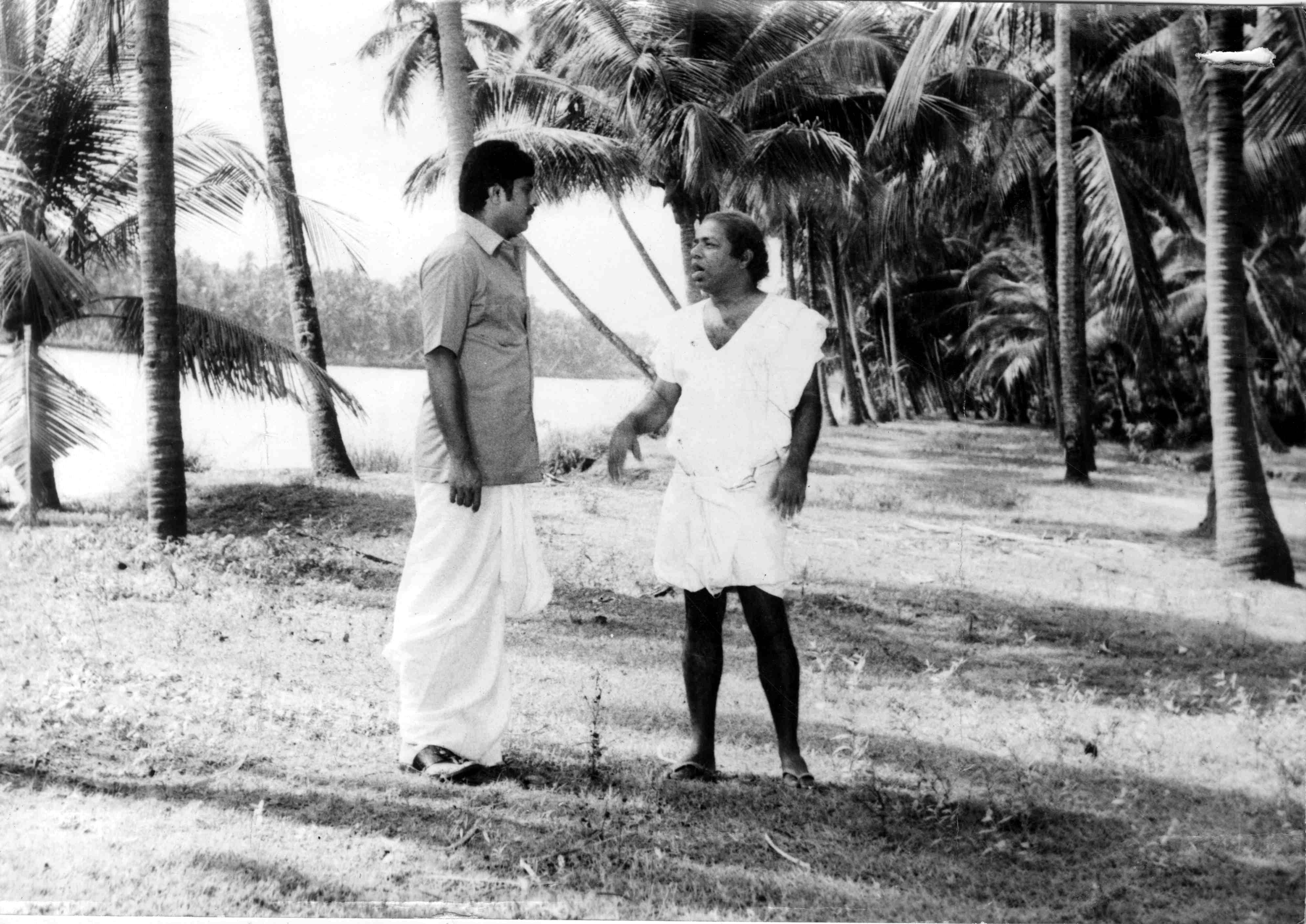 Thilakan with Mammooty in Oduvil Kittiya Vartha. (Express archive photo)
Thilakan with Mammooty in Oduvil Kittiya Vartha. (Express archive photo)
Soon, Thilakan began associating with various drama troupes and resumed pursuing acting. With a few friends, he established a troupe called the Mundakayam Nataka Samithy. Alongside this, he worked with KPAC, Kalidasa Kalakendram and Changanacherry Geetha. It was during this time that he met theatre legend PJ Antony — whom Thilakan always referred to as his beloved mentor — and began collaborating with him.
KG George, the saviour
It was Antony himself who paved the way for his foray into cinema. In Antony’s first and only directorial venture, Periyar (1973), Thilakan played a key role. However, it was the legendary filmmaker KG George who gave him the proper push. Playing an important character in George’s Ulkkadal (1979), Thilakan made his mark, and the filmmaker, spotting the actor’s immense potential, offered him his first impactful role in Kolangal (1981), where Thilakan’s performance as “Kallu” Varkey won hearts. Despite coming from a theatre background, his portrayal was devoid of over-dramatics, and without exaggeration, he convincingly embodied the character of an alcoholic.
From then on, George always saved the pièce de résistance characters — those whose perfect performance would elevate the films to soaring heights — for Thilakan. His portrayal of director-cum-drama troupe owner Vakkachan in Yavanika (1982) alone is enough to highlight the actor’s massive potential. His controlled, commanding and nuanced performance in Yavanika, one of India’s finest mystery thrillers, earned Thilakan his first Kerala State Film Award for Second Best Actor. He continued not only to make strides with his performances in George’s Lekhayude Maranam Oru Flashback (1983) and Adaminte Variyellu (1983), but also to prove that Malayalam cinema might have found one of its greatest actors of all time.
But could Thilakan, whose physique and voice appeared so rough and tough, handle comedy? If not, how could he be called a GOAT? George himself provided the answer in his political satire Panchavadi Palam (1984), where Thilakan’s hilarious and unhinged portrayal of the caricaturish politician Isahak Tharakan proved that he was an all-rounder. No matter how big or small the part was, Thilakan knocked it out of the park every time, as exemplified by movies like Oru Kochukatha Aarum Parayatha Katha, Uyarangalil, Koodum Thedi, Anubandham, Yathra and Irakal, for which he bagged his second state award.
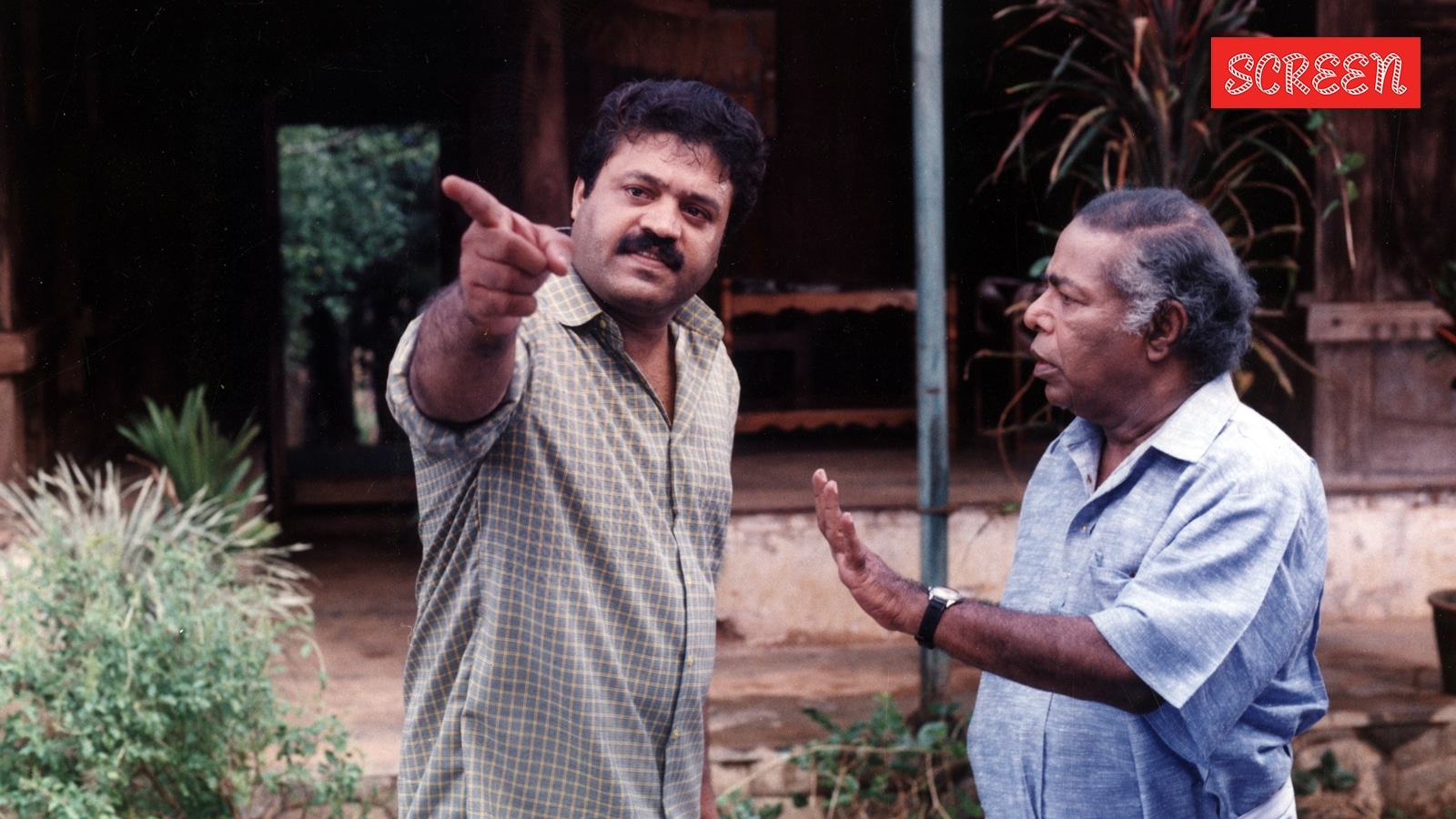 Thilakan with Suresh Gopi in film Saphalyam. (Express archive photo)
Thilakan with Suresh Gopi in film Saphalyam. (Express archive photo)
The immortalisation of the vilest villain
In 1986, Thilakan proved the extent of his mettle by playing diverse roles like the paper-tiger gangster Damodarji in Sanmanassullavarkku Samadhanam, the hysterical Yamarajan in Pappan Priyappetta Pappan and the serpent in human skin, Paul Pailokkaran, in P Padmarajan’s romantic classic Namukku Parkkan Munthirithoppukal. His portrayal of Paul, one of the vilest villains Malayalam cinema has ever produced, remains a benchmark performance. Rithubhedam (1987) earned him his first National Film Award for Best Supporting Actor. Even without relying on much physical transformation, Thilakan ensured each of his characters was distinct, as seen in films like Nadodikkattu, Amrutham Gamaya, Thaniyavarthanam and Unnikale Oru Katha Parayam.
In 1988, Padmarajan gave him another iconic role in the tragic drama Moonnam Pakkam, which became one of the defining performances of his career, bringing tears to all audiences’ eyes. The very next year, just when viewers thought they had seen his career-best performance, Thilakan outdid himself in Sibi Malayil’s Kireedam (1989) as Achuthan Nair, a cop whose dreams of his son following in his footsteps are crushed when the youth becomes entangled in crime. More than three decades later, Thilakan’s climactic scene with Mohanlal remains unmatched, a testament to their mastery.
Be it short or long in a movie,
Thilakan – Mohanlal combination has always been a feast to watch. 😍 pic.twitter.com/jkhoNoAWUF— ക്രിഷ്ണ എ ഡി 🎏 (@ludachrishna) May 28, 2022
Losing National Award to Amitabh Bachchan
For every brilliant comic turn in Chakkikotha Chankaran and Kattukuthira, he matched it with intense performances in films like Perumthachan. Although he was in the running for the National Award for Best Actor for Perumthachan, Thilakan was bested by Amitabh Bachchan, who won for Agneepath. In a 2008 interview with Rediff, Thilakan alleged he lost the award because a top Congress politician wanted Big B honoured to secure his support in campaigning.
But the winning or losing of trophies could never affect a legend’s journey, and Thilakan’s career is proof. He went on to become Malayalam cinema’s quintessential supporting and character actor, delivering exceptional performances in films like Sandesam, Mookilla Rajyathu, Kilukkam, Godfather, Georgekutty C/O Georgekutty, Sadayam, Kauravar, Chenkol, Pavithram, Pingami and Minnaram. In 1995, he added another unforgettable role to his repertoire with CP Chacko, alias “Kaduva” Chacko, in Spadikam, the ultimate example of a toxic parent. From Mayilpeelikkavu, Veendum Chila Veettukaryangal, Kannezhuthi Pottum Thottu and Narasimham to Randam Bhavam and Kilichundan Mampazham, Thilakan turned everything he touched to gold.
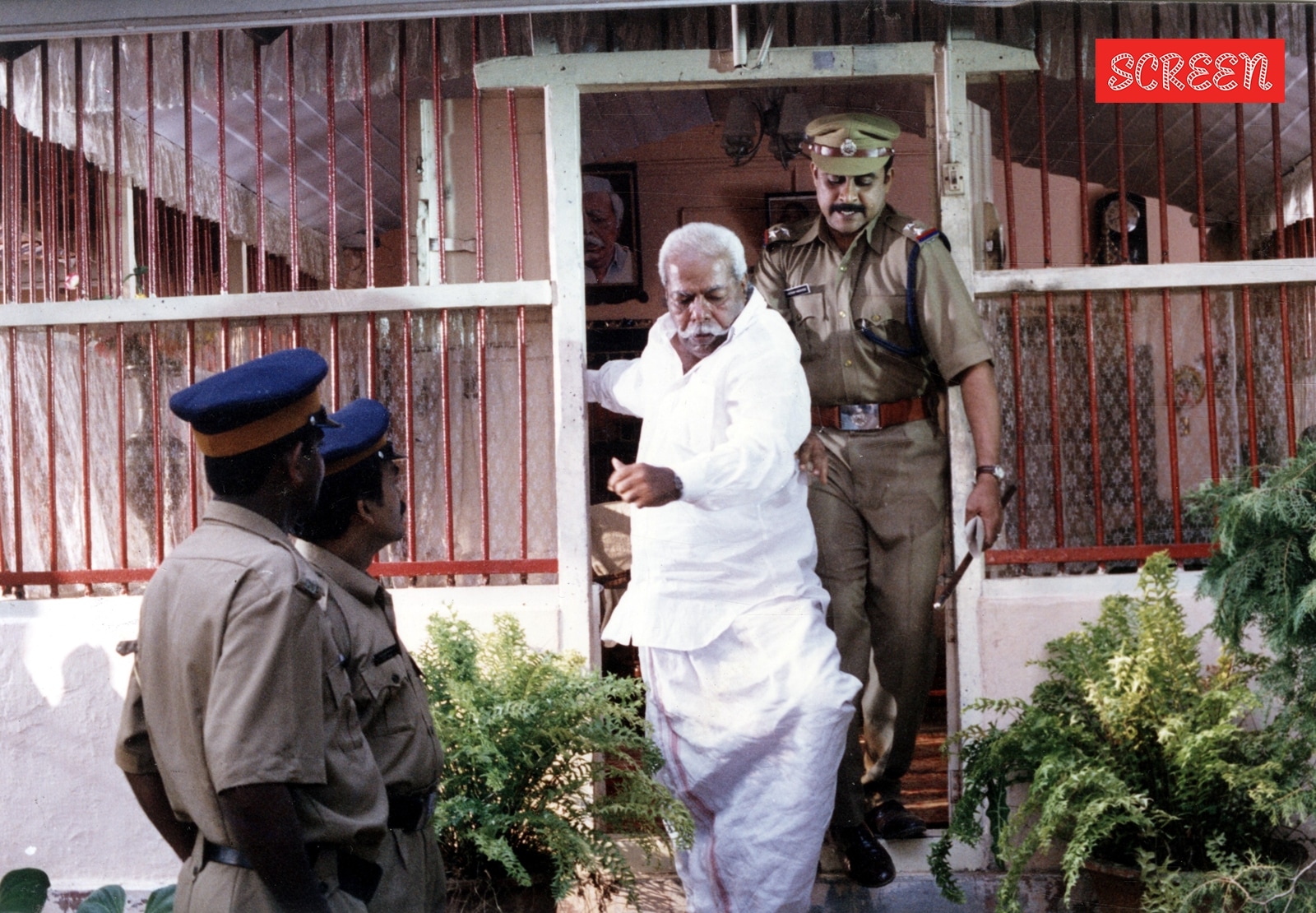 Thilakan in Gaandhiyan. (Express archive photo)
Thilakan in Gaandhiyan. (Express archive photo)
Thilakan vs Superstars
Even as he worked unstoppably, Thilakan never severed his connection to the grassroots and always voiced his concerns about the industry’s functioning. He time and again alleged that casteism was rampant and that his Ezhava identity had cost him opportunities in Malayalam cinema dominated by an unofficial “Thiruvananthapuram Nair lobby”. He claimed the lobby resented his many awards.
At the same time, he staunchly opposed the “ban culture”, which he ultimately faced. In 2010, Thilakan launched an all-out battle against film organisations for denying him the opportunity to act in Christian Brothers (2011) because he collaborated with MACTA head and director Vinayan, whom the rival FEFKA and some big actors opposed. Alleging that the film bodies were behaving like a “mafia”, he told IANS, “The two major organisations in the industry and the superstars are against me because I acted in the latest film directed by Vinayan. Three other actors who acted with me in the film are also finding it tough. I’m 74 and into my sixth decade as an actor, so I have decided I will fight for justice. Do you know, as a result of the so-called informal ban on me by these people, right now I have no films at all.”
He didn’t mince words in criticising superstars like Mohanlal, Mammootty and Dileep either. “The superstars are highly insecure. They don’t even like others matching up to their level, let alone outperforming them. They will not — and they can’t — take the slightest competition. I have outperformed them in many films, which obviously has not gone down well with them. If someone outperforms them, it is an open challenge to their stardom. People and the media praised my performance in their films. It might have been difficult for them to digest. They tried to push me around on screen. Once that failed, they tried it off the screen as well,” he told Rediff.
Yet Thilakan’s talent was far beyond any association’s ability to suppress, and every time he appeared on screen, audiences gave him the love he deserved. From Red Chillies’ Comrade Maani Varghese, Evidam Swargamanu’s Jermias and Nayakan’s Vincent Karanavar, to Indian Rupee’s Achutha Menon and Spirit’s Mesthiri, he soared. In his final years, he proved there was no one like Thilakan with his heartwarming portrayal of Kareem Ikka in Anwar Rasheed’s Ustad Hotel (2012). Besides Malayalam, he also worked in a few Tamil, Telugu and Kannada movies. He won the Padma Shri in 2009.
Thilakan passed away at 77. Even though years have passed since his demise, the legacy he left — as an actor and as a person who refused to bow to casteist lobbies, egoistic associations and superstars — remains an inspiration for generations. Thilakan showed with his life that he knew not only his worth, but also exactly when and where to stand firm.


Photos
Photos


- 01
- 02
- 03
- 04
- 05



